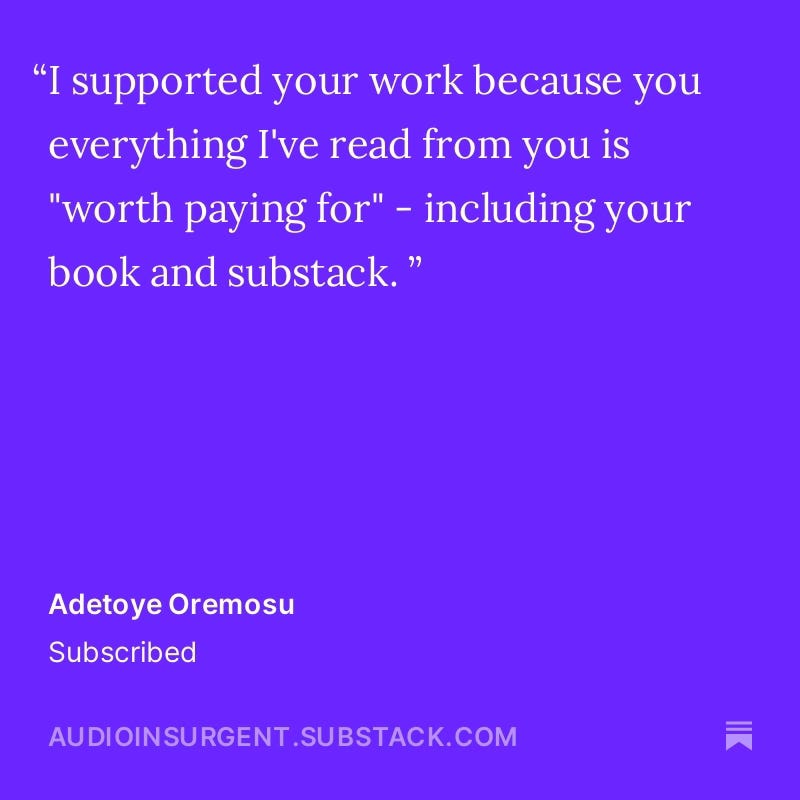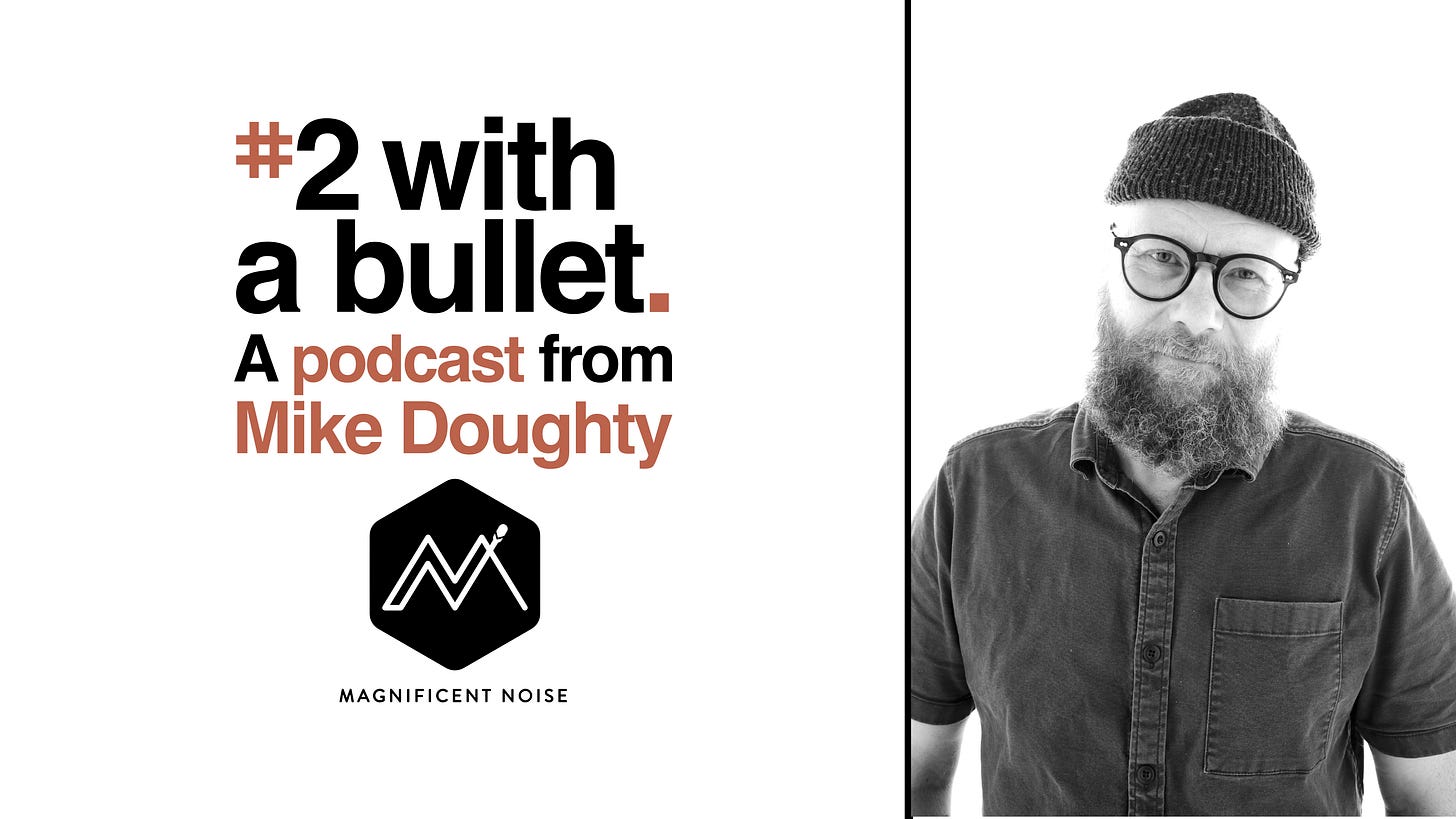The Anatomy of Hit Making
Every company and network is desperate to create hits, but no one is taking the time to think how hits are made.
Welcome to Dispatch #59 of The Audio Insurgent.
I’m trying to get back to shorter dispatches!! This one is half the size of the previous few dispatches…
To me, the best sign when you are working on a new project, regardless of your role on that project or even what kind of project it is–a news story, podcast, event series, is when you are genuinely excited to share it with the rest of the world and kinda can’t wait to do so. You feel like you’ll just pop because of the waiting—like a kid the week before Christmas. That’s when you know you have something good–something you are proud of and passionate about.
I have one of those percolating right now. It is a single-season multi-episode narrative podcast, something I haven’t put out in a bit of time. It’s a biography of a guy who has influenced the lives of everyone you know, but hardly anyone has ever heard of.
And this story is full-on bonkers. And that isn’t an exaggeration. If any of you have hung out with me over the past few years and asked “So, what are you working on?”, there is a great chance I told you about this show, this guy, the Illuminati, and a bunch of other really wild stories it contains.
I can’t share details yet–the trailer is coming out in a few weeks and the series drops May 1st. And I cannot wait. And don’t worry about missing it. When it comes out, I’m sure I won’t shut up about it for a while.
But moving on to things we can talk about…
Just a quick reminder that The Audio Insurgent is supported by readers like you who contribute a small amount to make this possible. If these dispatches have value to you, please consider becoming a paid subscriber for as little as $5.
[TODAY’S FIRST THING: TAPPING INTO THE HIVE MIND] Sharing this is an unconventional choice…but often the best outcomes come from following the unconventional choice.
Next week, I’m sending out a new podcast pilot and concept to networks and distributors to shop it around… and I’d like to tap The Audio Insurgent hive mind to help think of the perfect place for this project to land…aka, asking you “Where should I pitch this?”
The reason I’m trying to think outside the box on this is because, like a lot of our projects, it doesn’t fit cleanly into an established box, but it's very satisfying on a number of different podcast spectrums.
It’s called “Number 2 with a Bullet”--a chat show that looks at all the great songs that made it to Number 2 on the Billboard charts, but never made it to Number 1. Songs like “Wild Thing” by Tone Loc, “Material Girl,” by Madonna, “Bohemian Rhapsody” by Queen, “Do You Really Want to Hurt Me” by Culture Club, and hundreds of others. And there is often an interesting reason why it didn’t hit #1. It’s hosted by Mike Doughty, who some may know as the singer/songwriter behind Soul Coughing, and an equally amazing solo career since.
It is really funny and entertaining and nostalgic and you learn a lot about things that you didn’t think would be interesting–perfect podcast fodder.
But I am having trouble compiling a full list of companies/networks that seem like the right fit to pitch this to. So I thought I’d ask all of you for your ideas.
So you can look at the deck here, which includes links to listen to two (!!) pilots we made, and then, if you have suggestions of where I should take this, please email me and let me know. Perhaps we’ll give you a shout-out in the first episode!
When I mentioned to a friend that I was going to ask you all, her first reaction was “Aren’t you scared that someone would steal the idea?” Well, no, for two reasons. First, it is going out to market next week–so if someone was into stealing ideas, I can’t control that. (And, fun story, I once did have a company talk to me about a pitched idea, pass on it, then come out with their own knock-off a few months later. If we find ourselves sharing a beer in the future, you buy the next round and I’ll tell you who it was. 😉) And second, we’ve had people try to duplicate our projects so many times (how many Esther Perel knock-offs have there been? Hundreds?) and they all fail, because they don’t have the magic. You can’t steal magic.
And “magic” really isn’t magical. It’s the perfect combination of personality, subject, and moment–as we’ve discussed before. And speaking of magic…
[TODAY’S MAIN THING: HOW TO MAKE A HIT] When I speak to development execs at podcast companies or hear them speak, they all explicitly or implicitly say that they are on the hunt for hits: things that can go big, and go big quickly. It’s become such an obsession that they rarely talk about any other types of content or audience development. They want hits–easy hits–that can prove themselves almost from launch. This really isn’t surprising. But what I think is noteworthy is the way they think that they should go about it–and their lack of awareness of how much of a folly most of them are pursuing.
Let’s get something out of the way right now. The best way to ensure you will NOT make a hit podcast is by setting out with the intention of making a hit podcast. By focusing on making a hit, you draw yourselves away from the thing that makes a show attract and draw an audience.
The unfortunate way most people think about hit making is pretty similar, in my brain, to growing tomatoes.
Let’s say you want to have one big, bountiful tomato plant filled with healthy, juicy, tasty tomatoes. And let’s also say you have a packet of 25 tomato seeds. How do you figure out which tomato seed will grow into the plant yielding the great tomatoes?
If you borrow the logic of podcasting companies today, you’d open up the packet of tomato seeds, pour them onto the table, gather a group of tomato experts around, and proceed to argue over which seed is most likely to become the healthy plant with a lot of tomatoes.
Then these podcasters-turned-tomato-farmers plant that one seed that they all agree is the winner.
But here's the rub about growing tomatoes. Even if you start with seeds from an award-winning variety, half the seeds won’t even sprout. Of those that come up, a number will die before they even have many leaves, let alone fruit. The process of elimination continues–some sprout weird-shaped tomatoes, some don’t get enough water and sun–or perhaps too much, some get eaten by animals or bugs, and some just…die.
If you want to end up with one robust, bountiful tomato plant, you don’t plan one seed and wring your hands until it bears fruit. You should plant many seeds, as many as you have room for. Perhaps even all 25. Then you take an active role in winnowing down the crop until you end up with your healthy, bountiful tomato plant.
Again, back to podcasting—it’s basically the same process. Everyone wants the hit show. Everyone argues over which “seed” will be the hit and only develops that one. And, most likely, they don’t end up with a healthy plant with a lot of tomatoes on it.
Then the execs shrug their shoulders and blame the seed.
Earlier I said that no one who ever set out to make a hit podcast actually succeeded at making a hit podcast. So let’s reverse that. There have been plenty of hit podcasts, do they have anything in common? Yes, they do. They all resulted from a person or group of people who were passionate about what they were making, took the effort to find others who would be excited about what they were making, and had the patience to build a healthy ecosystem around it.
I’m always surprised at how many people are perfectly fine with putting mediocre things out into the world that they aren’t excited about. It happens far too often in every shop. How can you expect listeners to be excited about something when you aren’t excited about it?
That doesn’t mean that everyone who is excited about their project can make it a hit, but just because your podcast is fronted by someone famous, or someone who is funny, or tells the story of a dead white woman doesn’t mean it will be a hit. What you do doesn’t provoke a hit-like response, it is the way you do it.
Sure, you care and are really passionate and excited, but do you care enough to edit it again? Do you have enough passion to seek out more feedback from others? Are you excited enough to tell this story that you’ll take a training course to focus on the weaknesses in your skill?
I once had an editor tell me that after you’ve done a bunch of versions and revisions, torn it up and started over, gathered feedback from trusted friends, and sweated over every detail–that’s the point where the real editing can begin. Just when you think you are finished–that’s when you are ready to really start.
Want to make a hit? Have the commitment and patience to develop something, try/fail, and force yourself to grow. Be tenacious and relentless. Define who the audience is and go to them (as opposed to sitting around and waiting for them to come to you). And another element that’s required to make a hit? Nailing the “personality, subject, and moment” I mentioned earlier. It doesn’t really matter if you are new to podcasting and audio and working from your bedroom or you run a podcasting division at a large media conglomerate, the rules are surprisingly the same.
[CAN WE TALK ABOUT SOMETHING ELSE PLEASE?] I’m still going through Issue No. 1 of Sound Fields, a new online publication exploring the art of audio documentary. One of my collaborators, Ariana Martinez, is on its editorial board and they were so thrilled with this that I thought I’d spend some time with it. It’s deep, very thoughtfully provocative, and highlights a lot of impressive thought about the work of audio making. Totally worth some time to explore–but make sure to give yourself some time.
Okay, that’s it for today.
Thousands of people read this newsletter without even a free subscription. If this was forwarded to you or you read this online, would you mind subscribing?
If you are a regular reader of The Audio Insurgent, I hope you’ll consider doing your part by supporting this work with a small donation. And if that’s too much, you are also always welcome to buy my book or (even better) buy me a beer.
Make great things. I’ll be listening.
--Eric






